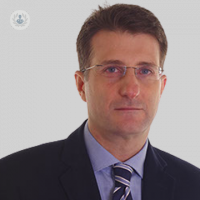Epigastric hernia: When is surgery required?
Written by:In this informative guide to epigastric hernias, highly respected consultant general surgeon Mr Filippo Di Franco explains what can aggravate the condition, the symptoms patients typically experience and when surgical intervention is required.

What is an epigastric hernia?
An epigastric hernia protrudes through the abdominal wall. More specifically, epigastric hernias occur in the upper part of the abdominal wall between the umbilicus and the lower part of the breast bone, usually on the midline.
What are the symptoms of an epigastric hernia?
Usually, patients with an epigastric hernia complain of a swelling in the midline between the umbilicus and the lower part of the breast bone. This can cause pain which becomes more obvious when a patient is standing for a long period of time or coughing or doing any intense physical activity.
What aggravates an epigastric hernia?
An epigastric hernia can be aggravated by any situation which increases the intraabdominal pressure. This could occur when straining, coughing or when performing physical activity.
How serious is an epigastric hernia?
An epigastric hernia can cause pain but might be complicated by a condition which is called incarceration strangulation. This usually happens when some fatty tissue protrudes through the hernia defect and it isn’t possible to push it back within the abdomen. In these circumstances, the condition is called incarceration and if the blood supply to the tissue is compromised, the hernia becomes strangulated. This is a medical emergency which may require urgent surgical intervention.
Do epigastric hernias always need surgery?
Epigastric hernias do not necessarily require surgery. The treatment plan depends on whether the hernia is symptomatic or not. Usually, if an epigastric hernia is causing pain, it would be advisable to perform an operation because of the risk of complications such as incarceration strangulation.
If you are seeking treatment for an epigastric hernia or are concerned about your symptoms, you can schedule an appointment with Mr Di Franco by visiting his Top Doctors profile.


